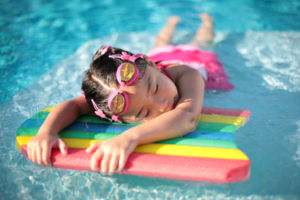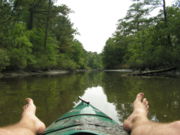Leisure
2007 Schools Wikipedia Selection. Related subjects: Recreation
Leisure is one's discretionary time spent in non-compulsory activities, time spent away from cares and toils. Because leisure time is free from compulsory activities such as employment, running a business, household chores, education, day-to-day stress, eating, and sleeping, it is often referred to as "free time". The distinction between leisure and compulsory activities is not strict, as compulsory activities may be done for pleasure as well as for long-term utility.
Etymology
Etymologically, the word leisure descends from the Latin word licere, meaning "to be permitted" or "to be free", via Old French leisir, and first appeared in the early 14th century. The 'u' first appeared in the early 16th century, probably by analogy with words such as pleasure .
A simple definition of leisure is "time spent out of work and essential domestic activity". -Leisure is the disposition of receptive underdstanding of contemplative beholding, and immersion-in the real.
For an experience to qualify as leisure, it must meet three criteria: 1) The experience is a state of mind. 2) It must be entered into voluntarily. 3) It must be intrinsically motivating of its own merit. (Neulinger, 1981)
The Greek word for leisure is "σχολή". This is the origin of the Latin for school ("scola"). To the Greek mind, the primary function of leisure was not necessarily recreational, but to expand ones awareness and understanding of the world. The social context of this understanding of leisure has, to a large extent, been lost, and with it the notion of leisure being the pursuit of philosophy.
History of the concept of leisure
The notions of leisure and leisure time are thought to have emerged in Victorian Britain in the late nineteenth century, late in the Industrial Revolution. Early factories required workers to perform long shifts, often up to eighteen hours per day, with only Sundays off work. By the 1870s though, more efficient machinery and the emergence of trade unions resulted in decreases in working hours per day, and allowed industrialists to give their workers Saturdays as well as Sundays off work. Affordable and reliable transport in the form of railways allowed urban workers to travel on their days off, with the first package holidays to seaside resorts appearing in the 1870s, a trend which spread to industrial nations in Europe and North America. As workers channeled their wages into leisure activities, the modern entertainment industry emerged in industrialised nations, catering to entertain workers on their days off. This Victorian concept - the weekend - heralded the beginning of leisure time as it is known today.
Types of leisure
- Active leisure: Active leisure implies a desired exertion of energy. Low-impact activities include walking and yoga, which expend little energy and have little contact or competition. High-impact activities such as kick-boxing consume much energy and are competitive. Active leisure and recreation overlap significantly.
- Passive leisure: Passive leisure implies a desire to refrain from exerting energy. Its purest form is lounging, "doing nothing", the kind of leisure which implies going into a near-sleep state. It is viewed by some as wasting time. Passive leisure that is not enjoyable can lead to boredom. Some moral codes frown upon this type of leisure, while others celebrate it, as in the British magazine The Idler. There are other passive activities that share many motivations and skills with the active types, and reflect our age, lifestyles and interests. Examples are going to the cinema, and gambling.
Examples of leisure activities
- Sitting outdoors whilst enjoying the scenery and sipping on a soft drink such as iced tea or hard drink such as brandy.
People who work indoors and spend most of their time sitting and doing paper work would probably need physical activity, e.g. playing a ball game, going camping, hiking or fishing. If their job involves a lot of physical activity, they would probably want to spend their free time at home reading books, magazines or watching TV. For some people collecting things is good free time hobby. They can collect stamps, postcards, badges, model cars or ships, bottles, antiques and so on.
People can spend their free time individually or their free time can be organized for example by schools or other institutions. Schools offer a lot of extra activities, especially sports activities. There are some hobby groups - the volleyball, football, basketball, handball teams, the computer clubs, the theatre clubs, choirs. Other institutions also offer extra activities for all people that want to spend their free time usefully. People can attend language schools, art schools, sports clubs and various groups where they can spend their time pleasantly with other people.
Most people like socializing. They enjoy going out with friends for dinner or a drink after a hard day at work. For many young people, having one regular night out a week is a normal part of their free time, whether it is joining friends for a drink in a pub, dining out in a restaurant, watching a film, playing videogames or dancing the night away at a club. For those who are not too tired after a long day at work, there is one more possibility: education. Many state and private companies require their staff to be university-educated so many of their employees, of all ages, spend their free time studying part-time at different universities. Thousands of people spend hundreds of hours every year learning foreign languages.
Cultural differences
Various cultures hold different views of leisure. Whether the culture is predominantly capitalist or socialist can greatly influence its appreciation of leisure.
Capitalist views
Capitalist societies often view active leisure activities positively. Many active leisure activities require an investment of time and money. Thus, it is more difficult to engage in such activities if one is poor. Capitalist societies often accord members who have more wealth with greater status. Those types of inactive leisure that also require an investment of time and money, such as "doing nothing" in a vacation atmosphere, are also viewed positively.
On the other hand, someone who "does nothing" at home is often referred to as "lazy" by others in the capitalist society, regardless of their financial situation. The wealthy person who does nothing but lounge around the pool at home is seen as lazy. However, the individual's financial investment helps determine the level of status an activity can give a person. So it is that "doing nothing" by your own pool has higher status than "doing nothing" watching television without cablltrle.
" Workaholics" are those who work compulsively at the expense of other activities. They prefer to work rather than spend time socializing and engaging in other leisure activities. Many see this as a necessary sacrifice to attain high-ranking corporate positions. However, these days increasing attention is being paid to the effects of such imbalance upon the worker and the family.
Historically, "workaholics" would not have been recognized as a problem and would have been highly commended in the US. Throughout its early history, American society was driven by the Protestant work ethic. This cultural view was inspired by the Protestant preacher John Calvin. There are a variety of Protestant sects that stem from Calvinism.
Socialist views
A socialist society would be expected to view activities that do not contribute to society in a negative manner. However, there are different forms of socialism. According to the philosopher Marcus Verhaegh, there were Europeans and Americans who, in the the 60's and 70's, advocated what might be termed a 'leisure socialism.' They believed if everyone is content with a smaller piece of the pie, everyone can then have their basic needs met. If everyone's basic needs are met, many in society can use their free time to pursue the arts, mysticism, athletics, various hobbies and other leisure activities.
Socialist writer E. Belfort Bax wrote in 1884 of a similar vision for socialist Europe in the article "Socialism and the Sunday Question" for Justice Again that work should be spread about so that everyone is provided with times of rest. His focus was on the elimination of one universal day of rest, but the general ideas are quite similar to those that emerged in nineteenth century America.

